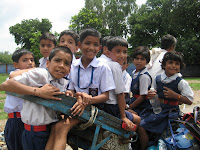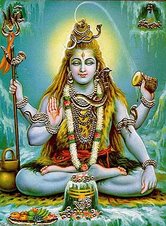
As I prepare for another school year, some crucial lessons and thoughts from my travels are percolating in my mind. Of course travel is maybe the best form of education, but prior to my trip I initially thought that my trip was about me. You know, like the universe was guiding me to India in order to bump me up another notch in my spiritual growth process. And that probably is true on one level...I certainly practiced a lot of active faith and trust.
However, what keeps swirling around my undisciplined mind (yes, Shivam and Claire, I DO need to meditate more) is more about inequity, white privilege, and the political nature of my calling. "(O)ur privileged dominance often threatens the physical and cultural well-being of other groups is a reality that Whites, for the most part, have chosen to ignore. The fact that we
can choose to ignore such realities is perhaps our most insidious privilege." (Gary R. Howard
We Can't Teach What We Don't Know: White Teachers, Multiracial Schools p. 66)
While spending time with my friend, Balla, in Varanasi, I was witness to some despicable discrimination. It was very disturbing to me when my hotel explained to me that "local" people were not allowed in my room. I *clearly* explained to them, of course, that I was paying for the room and would choose who could or could not come in my room. They asked me when I was leaving. Or when we were waiting on the train and suddenly Balla was surrounded by police. They wouldn't believe that we were traveling together until I was able to produce a ticket with both our names on it and had threatened to throw him in jail basically for hanging around me. Since much of this was going down in Hindi, it was hard for me object.
As disturbing as these and other similar events were, seeing the benefits of my white privilege in this new context is what I am still grappling with. Initially, I think I was so busy seeing the places and the people that I failed to notice that whenever we went anywhere Balla would push people out of my way. In some instances, it seemed kind of protective and paternalistic, but I soon realized it was something else altogether. There was a bias for the foreigner, for me. People would move out our way, like I was something special. I'm not going to lie, I enjoyed it, until I realized what was happening. I think I figured it out on the train when Balla was telling an elderly person to move out of my way. My heart sank and I thought, "No, you've got it all wrong. These people live here, this is THEIR place; I am no one, just a visitor lucky to be passing through." I am still deeply troubled by this realization. My friend IP confirmed that this preference for foreigners is indeed another legacy of colonialism that is still holding many people back.
The all-pervasive "fairness" creams are just another obvious manifestation of this same history.
While many may find it easy to ignore one's privilege or to get bogged down in guilt and remorse. Neither of these approaches will create greater social equity or healing however. Now that I am home, I am challenged to use these experiences not only to expand personally--in some aspects of our lives, good intentions are just not enough--but to transform my pedagogy. Teaching is politcal. I am either serving to reinforce traditional patterns of dominance, OR I am CONSCIOUSLY and ACTIVELY seeking ways to dismantle institutionalized forms of inequity and oppression. And frankly, it's the least I can do with all the unearned benefits of my white privilege.

























